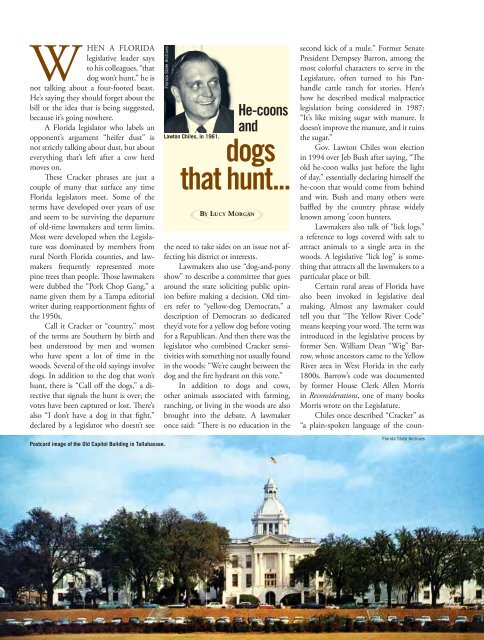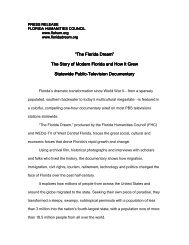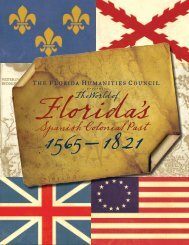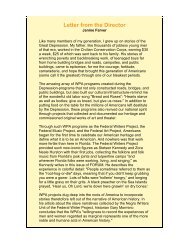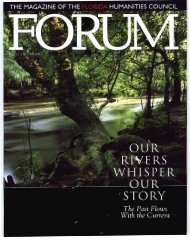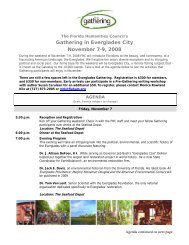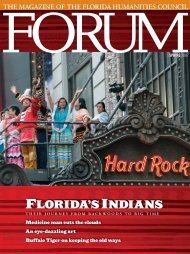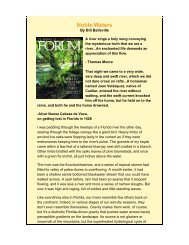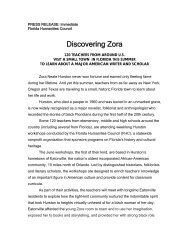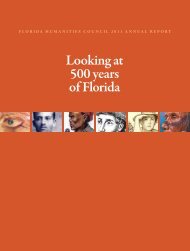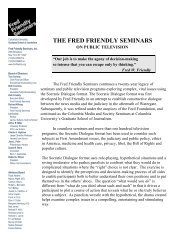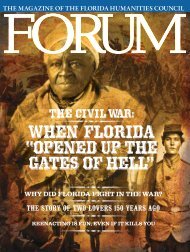THE MAGAZINE OF THE FLORIDA HUMANITIES COUNCIL
THE MAGAZINE OF THE FLORIDA HUMANITIES COUNCIL
THE MAGAZINE OF THE FLORIDA HUMANITIES COUNCIL
You also want an ePaper? Increase the reach of your titles
YUMPU automatically turns print PDFs into web optimized ePapers that Google loves.
WHEN A <strong>FLORIDA</strong><br />
legislative leader says<br />
to his colleagues, “that<br />
dog won’t hunt,” he is<br />
not talking about a four-footed beast.<br />
He’s saying they should forget about the<br />
bill or the idea that is being suggested,<br />
because it’s going nowhere.<br />
A Florida legislator who labels an<br />
opponent’s argument “heifer dust” is<br />
not strictly talking about dust, but about<br />
everything that’s left after a cow herd<br />
moves on.<br />
These Cracker phrases are just a<br />
couple of many that surface any time<br />
Florida legislators meet. Some of the<br />
terms have developed over years of use<br />
and seem to be surviving the departure<br />
of old-time lawmakers and term limits.<br />
Most were developed when the Legislature<br />
was dominated by members from<br />
rural North Florida counties, and lawmakers<br />
frequently represented more<br />
pine trees than people. Those lawmakers<br />
were dubbed the “Pork Chop Gang,” a<br />
name given them by a Tampa editorial<br />
writer during reapportionment fights of<br />
the 1950s.<br />
Call it Cracker or “country,” most<br />
of the terms are Southern by birth and<br />
best understood by men and women<br />
who have spent a lot of time in the<br />
woods. Several of the old sayings involve<br />
dogs. In addition to the dog that won’t<br />
hunt, there is “Call off the dogs,” a directive<br />
that signals the hunt is over; the<br />
votes have been captured or lost. There’s<br />
also “I don’t have a dog in that fight,”<br />
declared by a legislator who doesn’t see<br />
Postcard image of the Old Capitol Building in Tallahassee.<br />
Florida State Archives<br />
dogs<br />
that hunt...<br />
Lawton Chiles, in 1961.<br />
By Lucy Morgan<br />
He-coons<br />
and<br />
the need to take sides on an issue not affecting<br />
his district or interests.<br />
Lawmakers also use “dog-and-pony<br />
show” to describe a committee that goes<br />
around the state soliciting public opinion<br />
before making a decision. Old timers<br />
refer to “yellow-dog Democrats,” a<br />
description of Democrats so dedicated<br />
they’d vote for a yellow dog before voting<br />
for a Republican. And then there was the<br />
legislator who combined Cracker sensitivities<br />
with something not usually found<br />
in the woods: “We’re caught between the<br />
dog and the fire hydrant on this vote.”<br />
In addition to dogs and cows,<br />
other animals associated with farming,<br />
ranching, or living in the woods are also<br />
brought into the debate. A lawmaker<br />
once said: “There is no education in the<br />
second kick of a mule.” Former Senate<br />
President Dempsey Barron, among the<br />
most colorful characters to serve in the<br />
Legislature, often turned to his Panhandle<br />
cattle ranch for stories. Here’s<br />
how he described medical malpractice<br />
legislation being considered in 1987:<br />
“It’s like mixing sugar with manure. It<br />
doesn’t improve the manure, and it ruins<br />
the sugar.”<br />
Gov. Lawton Chiles won election<br />
in 1994 over Jeb Bush after saying, “The<br />
old he-coon walks just before the light<br />
of day,” essentially declaring himself the<br />
he-coon that would come from behind<br />
and win. Bush and many others were<br />
baffled by the country phrase widely<br />
known among ’coon hunters.<br />
Lawmakers also talk of “lick logs,”<br />
a reference to logs covered with salt to<br />
attract animals to a single area in the<br />
woods. A legislative “lick log” is something<br />
that attracts all the lawmakers to a<br />
particular place or bill.<br />
Certain rural areas of Florida have<br />
also been invoked in legislative deal<br />
making. Almost any lawmaker could<br />
tell you that “The Yellow River Code”<br />
means keeping your word. The term was<br />
introduced in the legislative process by<br />
former Sen. William Dean “Wig” Barrow,<br />
whose ancestors came to the Yellow<br />
River area in West Florida in the early<br />
1800s. Barrow’s code was documented<br />
by former House Clerk Allen Morris<br />
in Reconsiderations, one of many books<br />
Morris wrote on the Legislature.<br />
Chiles once described “Cracker” as<br />
“a plain-spoken language of the coun-<br />
Florida State Archives


